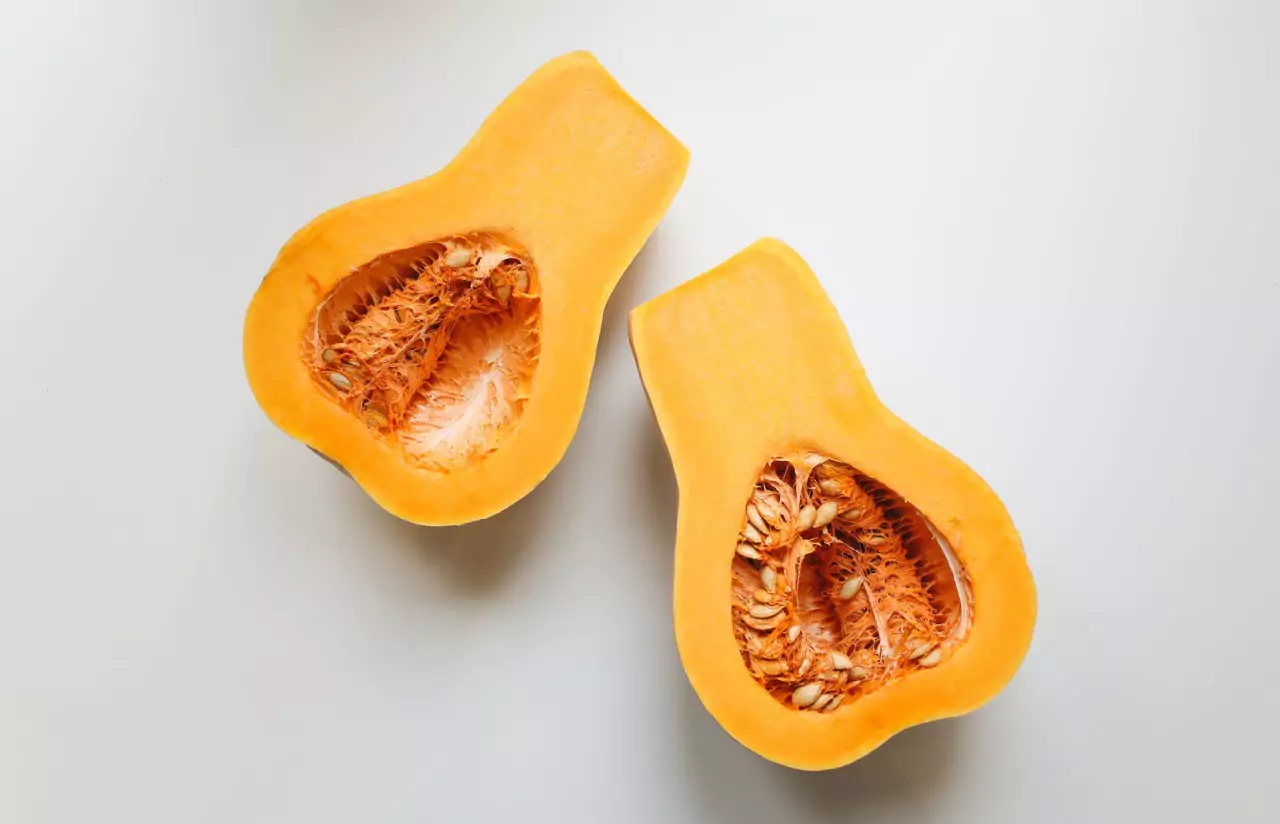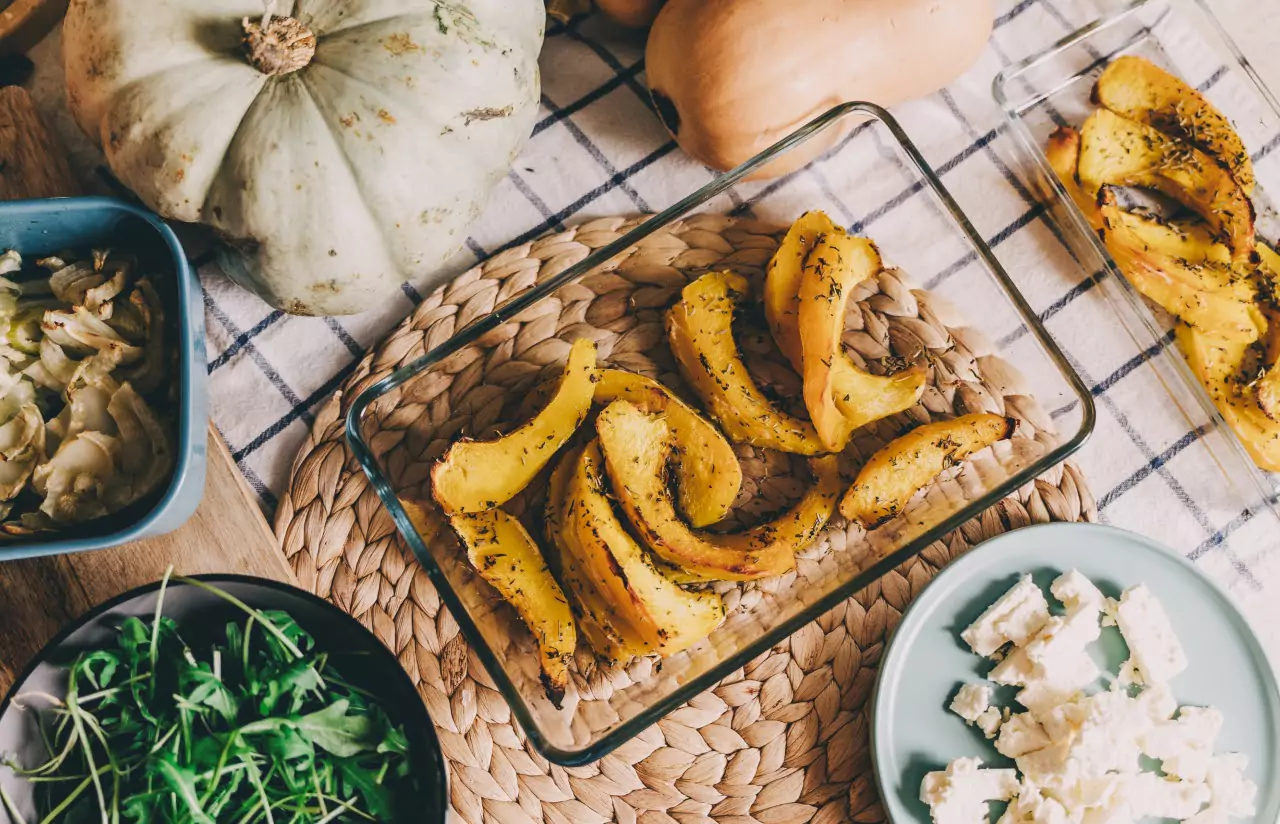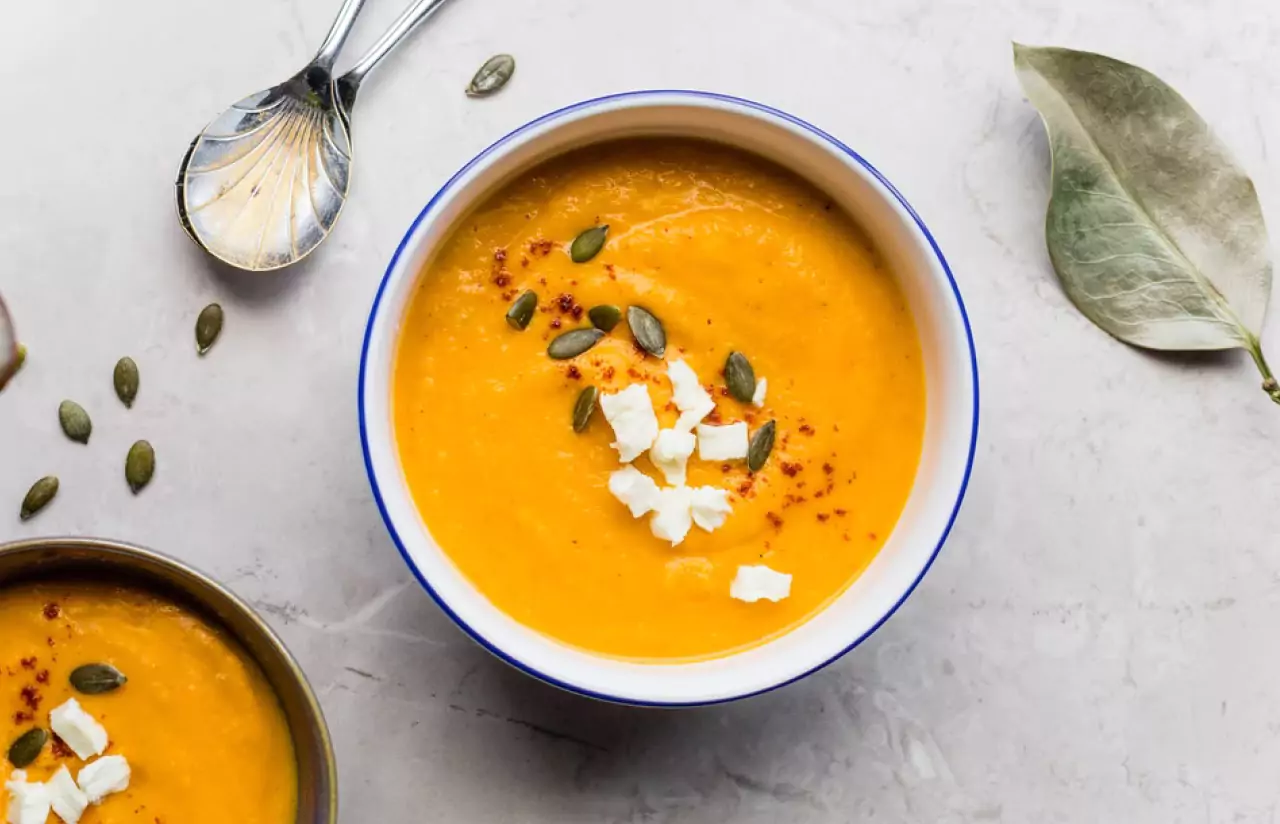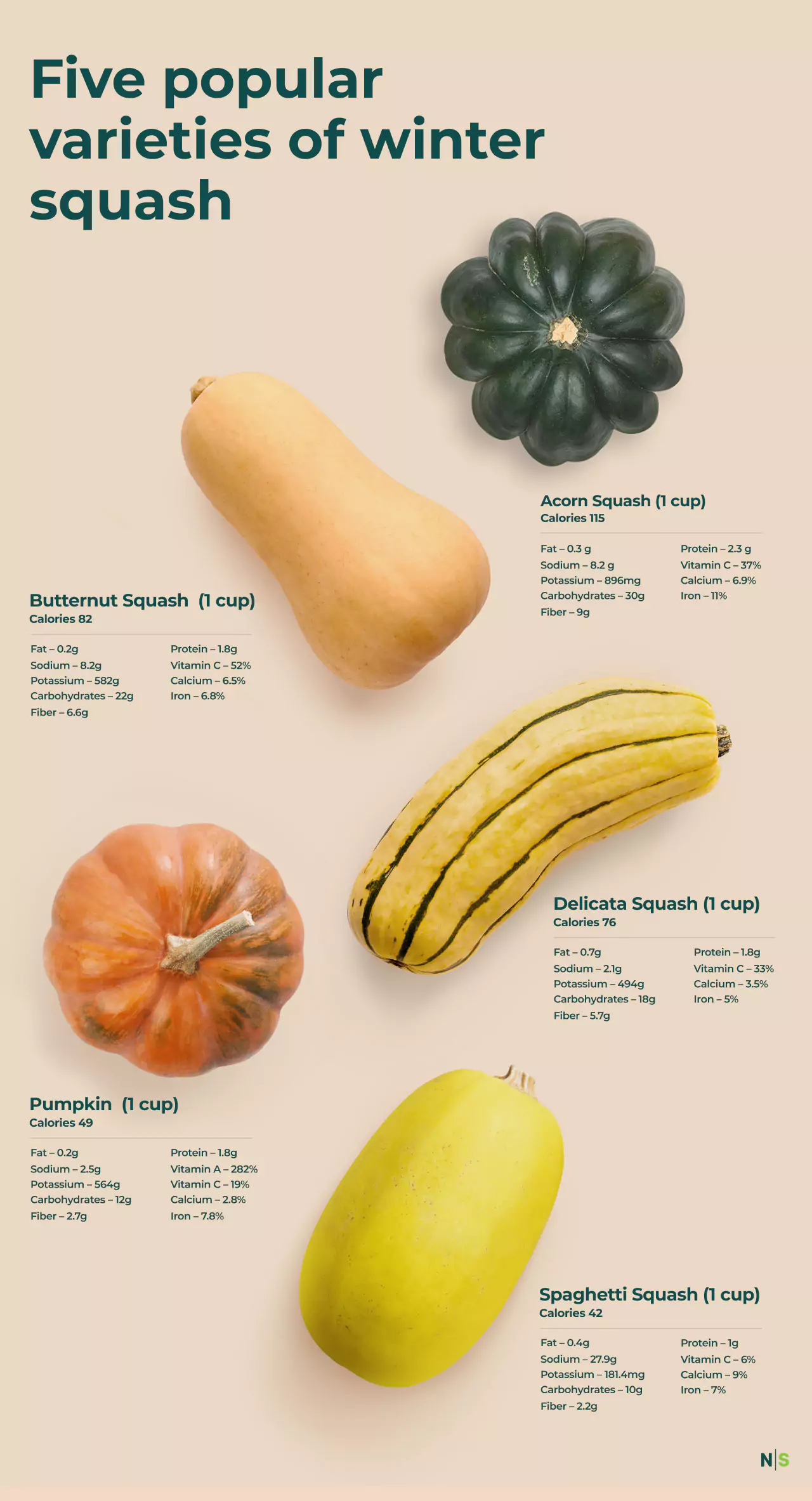Butternut Squash and Blood Sugar: Understanding the Impact

Key Takeaways
Every season has its star foods, and when there’s a chill in the air, the winter squash is ready to shine. A common ingredient in cozy winter recipes, squash (whether it’s pumpkin, summer squash, or winter squash) is one of our favorite foods this time of year.
Winter squash, in particular, is one of the most versatile, rich foods that’s in season during the winter months. These vegetables are tasty, and they’re also pretty to look at! From bright orange and golden to dark green and yellow-orange, these seasonal gourds are everything from table decor and side dishes to a core ingredient in wintry soups and stews.
What Is Winter Squash?

A seasonal gourd that you’ll find everywhere from farmers’ markets to grocery stores at the close of autumn, the unassuming winter squash has a lot going for it. The only real difference between a winter and summer squash is that they’re harvested differently.
Summer squash is harvested when it’s still immature, and the rind is soft and easy to eat—think of zucchini here. On the other hand, winter squash is harvested in a more mature stage, and the skin is more of a tough rind that’s not always eaten.
One of the most popular types of winter squash is the pumpkin—yes, it’s a type of winter squash, even though it’s commonly available during autumn. But at most grocery stores and markets you will also find others like:
- Acorn squash
- Spaghetti squash
- Hubbard squash
- Kabocha squash
- Butternut squash
- Delicata squash
- Carnival squash
- Japanese pumpkin
- Buttercup squash
- Sugar pumpkin
Different types of squash have unique pigments, but they all also have unique tastes and textures. Winter squashes have a remarkably dense consistency that lends itself well to baking and grilling.
It’s also a big hit in soups and stews, added to bread, mashed, and even made into desserts! Some squash varieties have nutrients in the skin, so you can leave that beautiful outside layer on when plating some squash dishes.
Is Winter Squash High In Carbs?

Being denser and heartier than many other foods does come with one caveat. Squash contains more carbohydrates than most vegetables.
Still, this also depends on the varieties of winter squash that you’re preparing. Winter squash also contains polysaccharides, which may help reduce blood glucose levels. Polysaccharides have also been found to improve overall glucose tolerance in subjects.
If you compare winter squash to other hearty, starchy foods like potatoes, sweet potatoes, and bread, it’s usually the winner in the carbohydrate department. A squash typically contains approximately half of the number of carbohydrates as the same amount of potatoes.
So, if you’re looking to cut out starchy carbohydrates, consider mashing or baking some winter squash instead of reaching for the potatoes as a side dish in your next meal.
What Is Winter Squash Rich In?

Winter squash is delicious, which is a good enough reason to add it to your diet, but it’s also packed with nutrients and dietary fiber. The meat and the skins (some winter squash can be eaten with the skin on while it’s best to peel other types) both contain these benefits.
- Polysaccharides: Polysaccharides are carbohydrates whose molecules consist of several sugar molecules bonded together. They have been linked to lowering blood glucose levels.
- Magnesium: Magnesium is a mineral that plays an essential role in your overall health and wellness. It helps level out blood pressure, supports good heart health, assists with muscle and nerve functions, may help with migraines, and aids blood glucose control.
- Potassium: Potassium is a mineral that is crucial for good cellular health. Potassium is responsible for maintaining the fluid levels in our cells and helps support blood pressure and muscle contractions.
- Vitamin C: Vitamin C is also commonly called ascorbic acid. It’s considered an antioxidant, and your body uses it to grow and repair body tissues. It can also help support your immune system.
- Vitamin B6: Vitamin B6 is a water-soluble vitamin and obtained through food. Vitamin B6 can affect your moods, sleeping patterns, and appetite. It has also been linked to fat and carbohydrate metabolism.
- Carotenoids: Carotenoids, present in plants and vegetables, are antioxidants when ingested. There are hundreds of different types of they’re linked to various health benefits, including reducing your risk of cancer and eye diseases.
- Fiber: Fiber is a carbohydrate, but one that we don’t digest and break down. Fiber bonds with water and sugars in our digestive system and helps our waste travel more quickly through our bodies. Fiber is also linked to a reduction in blood sugar spikes after eating.
Winter Squash and Insulin

Winter squash does not directly influence insulin production. Still, the polysaccharides in them do positively impact insulin sensitivity and blood glucose control.
A study conducted on type 2 diabetic rats found that pumpkin consumption reduced the need for insulin consumption. Researchers discovered that the rats naturally increased their insulin production when consuming pumpkins.
While there are no conclusive studies on human test subjects yet, eating squash provided some promising improvements in insulin production in animals. Because of those tests and the polysaccharide content, squash is sometimes a core inclusion in a diabetic-friendly diet.
Of course, there’s no one-size-fits-all for your diet, so it’s a good idea to track and monitor your individual response using a tool like a CGM. It’s also beneficial to work with a registered dietitian who will be able to optimize your diet and overall health based on your preferences, goals, and responses to food.
How to Choose and Prepare Winter Squash

Winter squash is delicious, beneficial, pretty... but how on earth do you pick the perfect one? There are many things to look for to get a quality, ripe squash to prepare. Here are a few tips for selecting winter squash:
- Make sure that there are no soft spots when you pick it up. This is a sign that there may be a rotting spot inside.
- Then, check to ensure there are no nicks or cuts on the surface. If the skin is damaged, there is a good chance that the squash may be spoiled when you cut it open. Winter squash develops tougher skin as it matures, so if the skin feels soft, you may want to choose another.
- The skin of your squash shouldn’t be shiny. As squash mature, the skin will go from glossy to matte. It may have been harvested too early if the skin is too shiny.
- If you don’t plan to cook with your squash right away, you can buy an unripe one and put it into a sunny spot a couple of days before you want to cook it to get it to ripen.
- Store your squash in a cool, dark, and dry area in your kitchen. You can keep a squash for about a month in these conditions before preparing it.
- You will need to peel certain types of squash before eating them. Rinse them with cold water and either cut or peel away the skin before or after cooking them. It can be easier to cook them to let them soften and then remove the skin.
- Other squashes like acorn or delicata can be eaten with the skin on. These squash carry a lot of nutrients in the peel as well, so we recommend leaving it on. It will also add a splash of color to your dish.
Squash can be roasted, boiled, stewed, fried, or grilled. There really is no wrong way to prepare it. Once cooked, squash is delicious, served mashed, cubed, or even stuffed. Want to start with an easy, delicious recipe? Try these delightful Butternut Squash Oven Fries!
The Nutritional Content of Different Types of Winter Squash
There are so many different types of winter squash, so you’ll have to try them all to find your favorite. The health benefits of winter squash include everything from anti-inflammatory and cholesterol-lowering properties to preventing issues like heart disease and better immune function. They may also help with problems like constipation and high blood pressure.
Just like every variety of winter squash has a slightly different flavor, texture, and pigment, they also have a varying carb, vitamin, and potassium content. And they have a variety of other properties, including folates, thiamin (a B vitamin that helps metabolize food), manganese, vitamin E, vitamin A, vitamin C, lutein, and zeaxanthin (which promote better eye health).
Butternut squash, for example, is rich in vitamin A and carotenoids like beta-carotene and alpha-carotene. Acorn squash is beneficial for heart health and a good source of B vitamins, magnesium, and potassium, among other nutrients. Listed below are five popular varieties of winter squash so you can see how each type differs in nutritional value:

Find the right Nutrisense programto turn insight into progress.
Go Beyond Glucose Data with Nutrisense
Your glucose can significantly impact how your body feels and functions. That’s why stable levels are an important factor in supporting overall wellbeing. But viewing glucose isn't enough. Nutrisense, you’ll be able to learn how to use your body's data to make informed lifestyle choices that support healthy living.
One-to-one coaching
Sign up to access insurance-covered video calls to work with a glucose expert: a personal registered dietitian or certified nutritionist who will help tailor your lifestyle and diet to your goals.
Monitor and measure what matters
With the Nutrisense CGM Program, you can monitor your glucose with health tech like glucose biosensors and continuous glucose monitor (CGM)s, and analyze the trends over time with the Nutrisense App. This will help you make the most informed choices about the foods you consume and their impact on your health.
Find your best fit
Ready to take the first step? Start with our quiz to find the right Nutrisense program to help you take control.

Kara Collier is a registered dietitian nutritionist and certified nutrition support clinician who is passionate about reshaping how we approach prevention, behavior change, and metabolic health. A Forbes 30 Under 30 honoree, she’s helped over 150,000 people improve their metabolic health using tools like continuous glucose monitors and behavior-focused nutrition strategies. Kara has been featured by Forbes, UC Berkeley, and HLTH, and has appeared on top podcasts like Mind Pump and The Genius Life.




